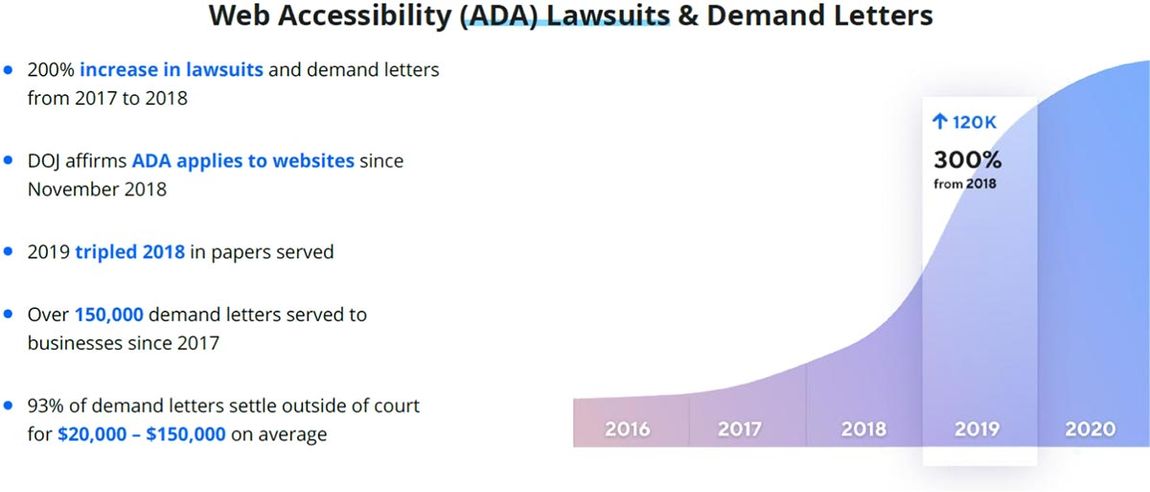This may sound alarmist, but there's a worrying rise in lawsuits against companies for not catering to all needs.
By Barry Alt
![]()

By Barry Alt
 Above: ADA Timeline and legal statistics from Accessibe web accessibility application.
Above: ADA Timeline and legal statistics from Accessibe web accessibility application.The Americans with Disability Act (ADA) has brought into law the right to equal access to information online.
The incoming lawsuits aren’t restricted to just the big players either – small entrepreneurs and international companies alike are affected.
Businesses that have already been sued include the likes of Bank of America, Target, Winn Dixie, Home Depot and Weight Watchers – but smaller companies are being pursued too. Island Comfort Footwear in Florida were put out of business due to an ADA lawsuit.
In 2018, there were 2,285 ADA lawsuits filed, up 187% on 2017’s figures. One woman in Florida sued over 175 business owners under ADA.
According to Fingerlakes.com, 26 New York wineries are presently being sued for not being compatible with screen-reading software. Last year, more than 1,000 ADA lawsuits had been filed in New York.
ADA covers private websites too – it’s like having a store in the mall with no wheelchair ramp – you CAN get sued for not being accessible. This is a legal requirement, it’s not optional.
So with such a wide-reaching law now being enforced, you probably have a few questions about the law, how it affects you and what it actually is. Here’s our introduction to The Americans with Disability Act (ADA) and it’s enforcement on the web.
On July 26, 1990, George W. Bush signed into law The Americans with Disabilities Act (ADA). The ADA law prohibits discrimination against people with disabilities. It prohibits private employers, state and local governments, employment agencies, and labor unions from discriminating against the disabled.
While no mention of websites appears in the ADA law (it was signed in 1990 after all!), it does prohibit companies from putting up communication barriers that restrict access for all.
As people now use the internet for every aspect of their daily lives (and with many services now online only) Title III of the ADA has expanded from brick and mortar establishments to include those who have a business on the Internet too.
Think about how many of our daily errands are now completed online – from banking, shopping, preparing taxes to studying – everything is now online. Now imagine if you were trying to complete your taxes online and the website you’re using doesn’t work correctly. Not only are you going to be incredibly frustrated, you’re going to be prevented from completing an essential task.
For people who use assistive devices (such as screen readers, Braille output devices, or interactive voiceover software) if they find your website is not accessible using their device, they may be forced to leave the website, lodge a complaint or initiate litigation against you.
The law provides no time for a company to take action before a lawsuit is filed, and it offers no real defense to a company after a lawsuit has been filed.
Wear glasses or contact lenses? You’re officially using assistive technology to be able to see properly.
People with visual impairments who require more than glasses, such as those with color blindness, low vision, and legal blindness, use special alternative views or may also use screen readers.
For people who are hearing impaired, closed captioning or a downloadable transcription of any on-site audio must be provided.
People with a physical disability may not be able to use a keyboard and instead use special equipment, such as head pointers, eye movement devices or text to speech software.
People with blindness, dyslexia and other learning disabilities may also use text to speech.
This is a super short list of some of the most commonly used assistive technologies – but for the average website owner, it can be eye-opening. In order for all of your customers, clients or general site visitors to be able to use your website fully, it needs to be able to work with all of the above technologies.
To help you (or your website developer) attain full accessibility online, your website should follow the WCAG guidelines…
Please head on over to the Motorhead Digital Blog for the rest of this article.
Barry is the founder of Motorhead Digital, providing signature Marketing Maximizer™ programs specifically developed for auto restoration, performance and restyling shops. These programs are geared towards customer acquisition and conversion to keep those project bookings coming. With over 23 years of experience in digital marketing and web development, Barry’s goal is to help clients market and grow their shops through strategic marketing practices. You can reach him at (585) 766-9785, [email protected] or online at MotorheadDigital.com